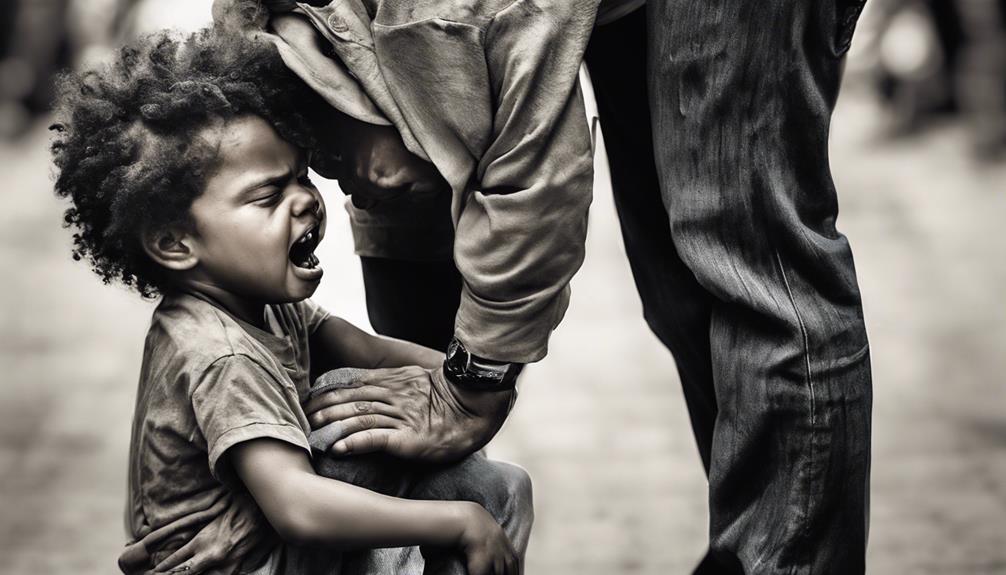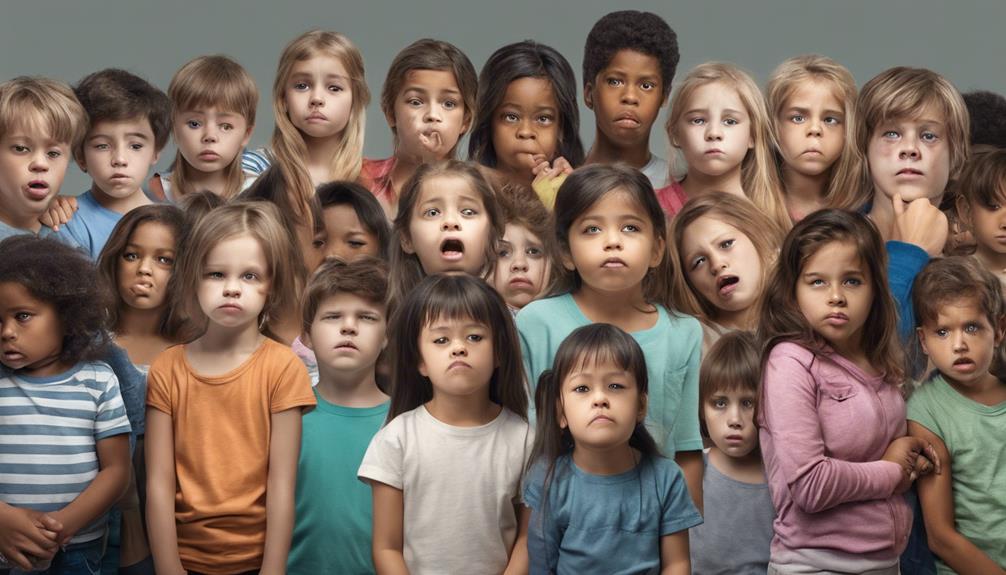Exploring the complexities of divorce and its impact on children reveals that approximately 40% of kids in the United States are expected to experience their parents’ separation before turning 16.
Understanding how divorce affects children of different ages is essential in providing them with the support and guidance they need to thrive amidst this challenging transition.
From infants to young adults, each age group faces unique emotional and psychological challenges that require careful consideration and intervention.
Let's explore the varying effects of divorce on children at different stages of development and ways we can help them cope effectively.
Key Takeaways
- Infants and toddlers require stable routines and nurturing environments post-divorce for optimal development.
- Preschoolers and school-age children benefit from emotional support, stable routines, and reassurance of love.
- Adolescents may struggle with communication and coping mechanisms post-divorce, necessitating therapy or counseling.
- Young adults may face emotional instability from unresolved parental conflicts, highlighting the importance of seeking professional help.
Divorce Effects on Infants
How does divorce affect infants in their early development stages? The effects of divorce on infants can be profound, as they're highly sensitive to disruptions in their routine and environment. Infants may exhibit clinginess, increased crying, or regression behaviors as a response to the changes post-divorce. Providing consistent caregiving, stable routines, and a nurturing environment are crucial for supporting infants through this challenging time. While infants may not comprehend the concept of divorce, they can pick up on shifts in their caregivers' emotional state and surroundings, which can impact their sense of security.
During and after a divorce, maintaining stability, predictability, and emotional connection with primary caregivers is essential for infants' well-being. Positive interactions, physical affection, and responsive caregiving play a vital role in helping infants feel secure and loved amidst the changes. By prioritizing their needs and ensuring a supportive environment, caregivers can help infants navigate the complexities of divorce with resilience and emotional well-being.
Impact on Toddlers and Preschoolers

As toddlers and preschoolers navigate their parents' divorce, they may display signs of clinginess, regression, and heightened separation anxiety. This period can be especially challenging for young children as they struggle to comprehend the changes happening around them. Here's how the impact manifests in this age group:
- Clinginess: Toddlers and preschoolers may seek more physical closeness and reassurance from caregivers.
- Regression: Some children might revert to behaviors they'd previously outgrown, such as bedwetting or thumb-sucking.
- Emotional Distress: Feelings of fear, insecurity, and self-blame can emerge, leading to emotional upheaval.
- Behavioral Changes: Tantrums, aggression, or withdrawal are common responses to the stress of divorce.
- Need for Stability: Consistent routines, loving environments, and reassurance of safety are crucial for their well-being.
During this tumultuous time, providing extra comfort, attention, and stability can help toddlers and preschoolers cope with the challenges of divorce effectively. Remember, they thrive in environments that offer love, consistency, and reassurance.
Influence on School-Age Children
When considering the influence of divorce on school-age children, one must acknowledge the significant emotional and behavioral challenges they may face during this transitional period. School-age children are particularly vulnerable to feelings of depression, anxiety, and behavioral changes as they try to navigate the complexities of their family situation. They often struggle with self-blame, remembering happier times when the family was whole, and may find it hard to concentrate on their academic performance due to emotional turmoil. Social interactions may become strained as they withdraw or have difficulty connecting with their peers.
During this challenging time, providing stable routines, emotional support, and reassurance of love and safety are essential for helping school-age children cope with the impacts of divorce. By maintaining consistent schedules, offering a listening ear, and reinforcing feelings of security, caregivers can help children navigate these turbulent emotions and foster resilience in the face of adversity.
Consequences for Adolescents

Navigating the aftermath of divorce, adolescents often find themselves grappling with the consequences of their parents' separation on their evolving sense of independence and relationships.
Adolescents may face communication challenges during the divorce process, struggling to express their emotions and needs effectively.
Encouraging stable relationships with peers and family members can provide a protective buffer for adolescents amidst the turmoil.
Coping mechanisms vary based on individual factors, with some adolescents turning to unhealthy behaviors while others seek healthier outlets.
Seeking therapy or counseling for adolescents displaying concerning behavior can offer valuable support in helping them navigate the impact of divorce.
Understanding the complex interplay of individual factors, peer relationships, and adolescent behavior is crucial in providing the necessary guidance and assistance for adolescents during this challenging period.
Ramifications for Young Adults
Young adults encountering the ramifications of their parents' divorce may grapple with the enduring effects of unresolved parental conflicts on their mental well-being. It is common for young adults to feel the weight of their parents' negative interactions and the pressure to act as mediators, which can significantly impact their emotional stability. Parents must refrain from speaking negatively about each other to prevent further harm to their children's well-being. Counseling services play a vital role in helping young adults navigate the lingering impact of their parents' divorce, providing a safe space to express their feelings and develop coping mechanisms. By prioritizing the needs of their children and seeking professional help when necessary, parents can support their young adults in overcoming the challenges posed by divorce. Below is a table summarizing key considerations for parents and young adults:
| Consideration | Description | Importance |
|---|---|---|
| Avoid Negative Speaking | Refrain from speaking negatively about the other parent to protect young adults' well-being. | High |
| Seek Counseling | Counseling services can offer valuable support for young adults coping with divorce effects. | Essential |
| Prioritize Emotional Stability | Parents must prioritize their children's emotional stability during and after the divorce. | Crucial |
Frequently Asked Questions
At What Age Is a Child Most Affected by Divorce?
We believe that children between 6 to 12 years old may be most affected by divorce due to their heightened awareness, emotional vulnerability, and tendency to blame themselves. Support, reassurance, and tailored counseling are crucial for their well-being.
How Experience of Divorce Relates to Childs Age?
As we consider how the experience of divorce relates to a child's age, we see distinct emotional impacts. Babies and toddlers may cling more, while preschoolers feel scared. Elementary kids struggle greatly, and teens face loyalty conflicts. Understanding these dynamics is crucial.
How Does Divorce Affect the Oldest Child?
Divorce impacts the oldest child by increasing responsibilities, feelings of abandonment, and loyalty conflicts. Adjusting to new family dynamics can be challenging. Both parents' support and communication are vital for helping the oldest child navigate these emotional upheavals.
How Long Does It Take for Kids to Adjust to Divorce?
We believe kids' adjustment to divorce varies. Young ones might take 1-2 years, while teens could need 2-3 years. Factors like parental conflict and support impact this. Long-term resilience post-divorce can develop over several years.
Conclusion
In conclusion, it's crucial to recognize the varying effects of divorce on children of different ages. From infants to young adults, the impact can be profound and long-lasting. We must provide support, understanding, and love to help them navigate this challenging time.
Remember, a little extra care and attention can make a world of difference in helping our children thrive and overcome the struggles they face. Let's wrap them in a blanket of love and support as they weather this storm.










